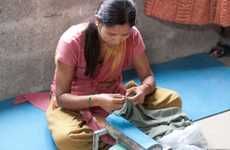
Kauli is a Social Enterprise Supporting Tanzanian Women
Social Business Editor — July 30, 2014 — Social Good
We don't cover much fashion on SocialBusiness.org but when we do, we admire it fully, and Kauli is an example of the way that ethical fashion converges with culture and social mission.
Kauli focuses on supporting women in Tanzania, who are mainly their employees. Some of the perks include living wages, health care, training, community meetings, empowerment seminars and more. In addition, sales from the fashion lines go into TEACH, which stands for Time to Empower Africa’s Children, which empowers youth in Kilimanjaro. The social enterprise is based in Moshi, Tanzania.
The fashion design itself tends to be printed bags and purses that mix textiles, hardware and leathers. It's a mix of urban cool with ethereal earth.
Contact Information
Kauli website
Kauli on Twitter
Kauli on Facebook
Kauli focuses on supporting women in Tanzania, who are mainly their employees. Some of the perks include living wages, health care, training, community meetings, empowerment seminars and more. In addition, sales from the fashion lines go into TEACH, which stands for Time to Empower Africa’s Children, which empowers youth in Kilimanjaro. The social enterprise is based in Moshi, Tanzania.
The fashion design itself tends to be printed bags and purses that mix textiles, hardware and leathers. It's a mix of urban cool with ethereal earth.
Contact Information
Kauli website
Kauli on Twitter
Kauli on Facebook
Trend Themes
1. Ethical Fashion - Opportunity for businesses to merge fashion with a social mission, supporting underprivileged communities and empowering women.
2. Cultural Convergence - Exploring the intersection of fashion and culture to create unique and sustainable products.
3. Empowerment Initiatives - Investing in programs that provide training, healthcare, and community support to uplift disadvantaged individuals.
Industry Implications
1. Fashion Design - Incorporating sustainable and ethical practices into fashion designs and production processes.
2. Social Enterprises - Using business models to address social issues and empower marginalized communities.
3. Youth Empowerment - Focusing on initiatives that empower young individuals through education, employment, and skill-building programs.
4
Score
Popularity
Activity
Freshness























